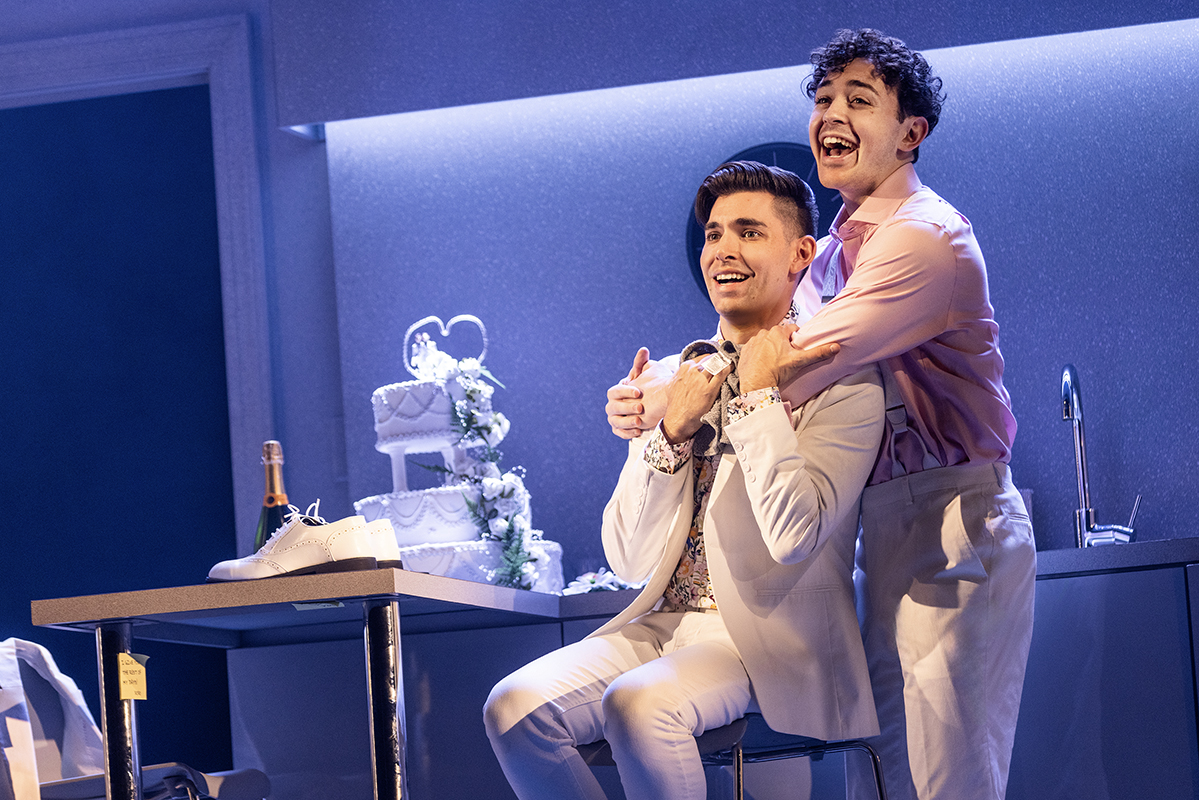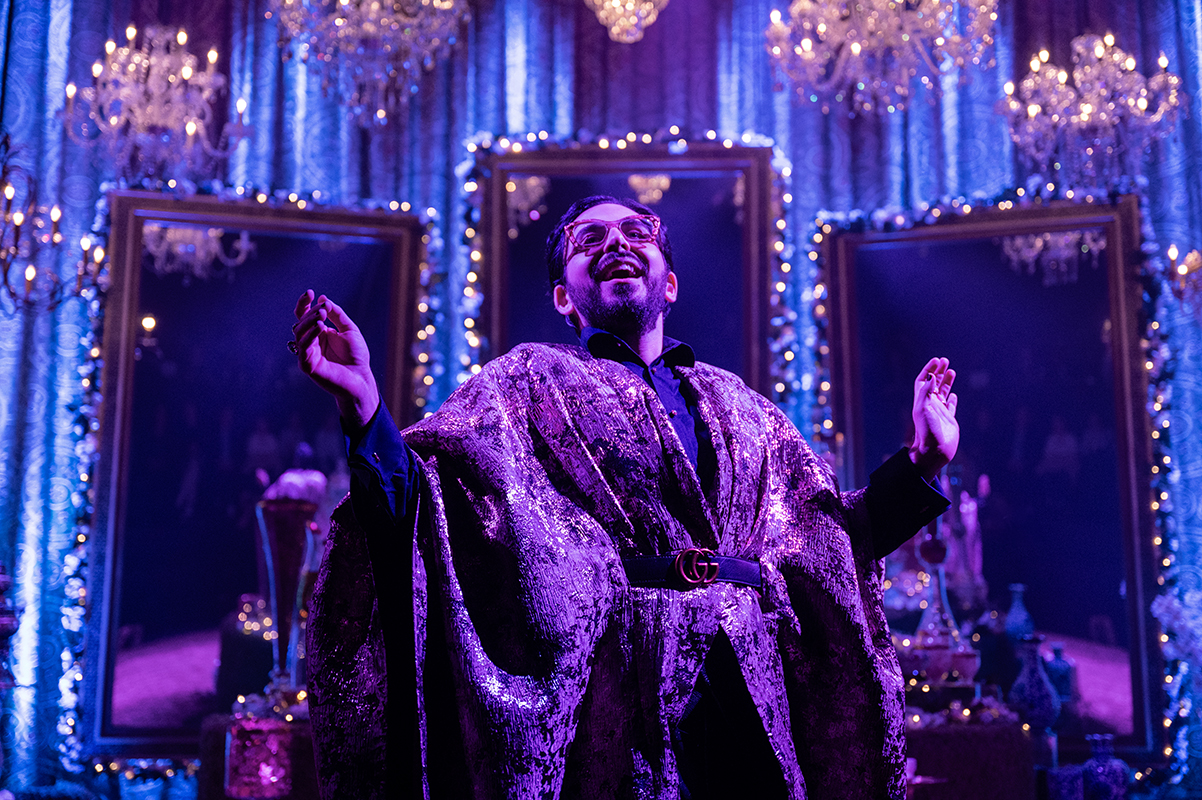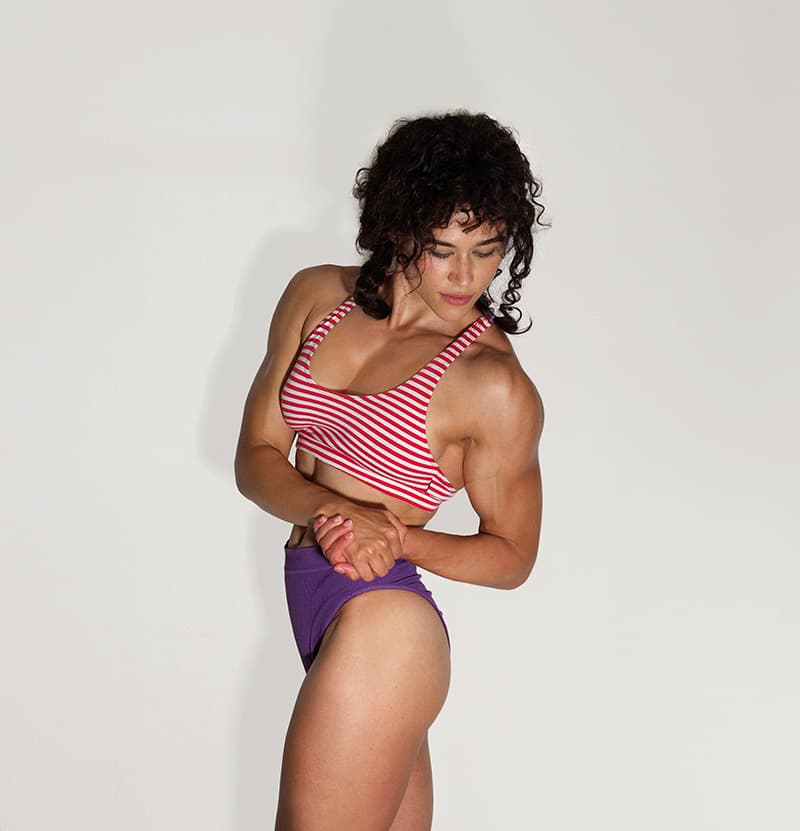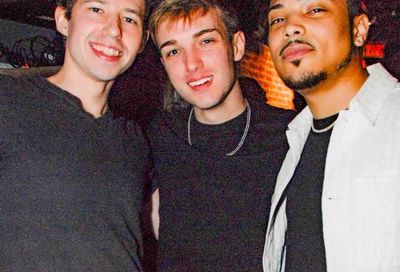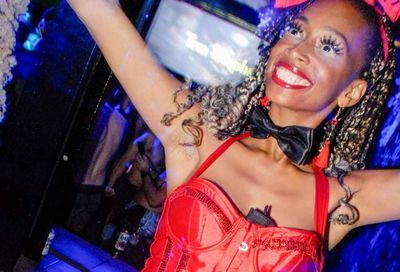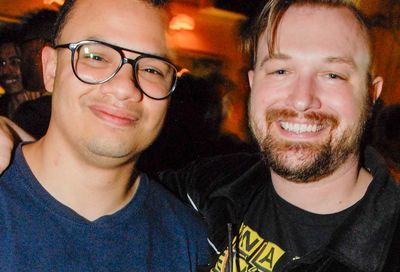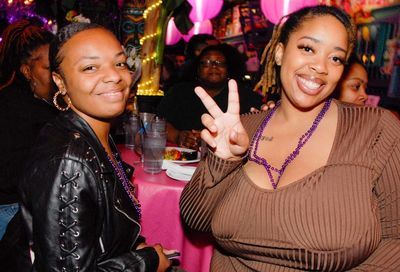Lea Confidential: Lea DeLaria on Big Boo, her love of music, and being a queer role model.
The Orange is the New Black star opens up about her time on the hit show, her passion for music, and how being a role model to thousands of "baby dykes" brings her the greatest joy of all.

“Are you recording this?”
Lea DeLaria interrupts herself mid-thought. “Or are you writing and taking notes?”
When it’s affirmed that the conversation is in fact being recorded, she lets loose an audible sigh of relief.
“Good. I just wanted to know how fast I should go.”
She goes plenty fast. While DeLaria might not be the speed demon of interview-speak as colleague Kathy Griffin, she tears into questions with a headlong, unstoppable relentlessness. Her answers are sleek and sure, a combination of alacrity, intellect, class, and, of course, crass.
She is, after all, Lea DeLaria. There’s an image to uphold.
“I was an openly gay, known, outspoken dyke comic in San Francisco in the 1980s,” she says. “That gives you a clue to some of what I was doing, and the politics I was involved in. That’s why people have always known me as kind of a radical, in your face queer.”
Long a mainstay of the stand-up scene — in the early ’90s she was the first out gay comic to appear on a late night talk show — DeLaria is one of those performers who not only can do it all, but do it all extremely well. Require proof? Search YouTube for her rafters-busting rendition of “I Can Cook, Too” from a showstopping turn in the 1998 Broadway revival of On the Town. A few years later, in 2000, DeLaria bent genders in the Rocky Horror Broadway revival as — who else? — Eddie/Dr. Scott. Eddie’s teddy was never the same.
DeLaria is also a highly celebrated jazz singer with a flair toward unique interpretations — give a listen to 2015’s House of David, in which she gloriously jazzes up the hits of the late David Bowie, and which she’ll be performing selections from when she appears for a three-night stint next weekend at D.C.’s storied jazz club, Blues Alley.
“I’m doing a lot of House of David right now,” says DeLaria, on the phone last weekend from L.A., where she was appearing for three nights in a full production of Mamma Mia! “There will be a smattering of other favorites from my records over the years. And there will be talk. All singers talk between songs. It’s just that I come from the world of stand-up comedy. So when I talk, it’s a little different than when Audra McDonald talks or when Joan Baez talks.” She laughs. “I imagine I’ll be ripping Trump a new one. You’ll be hearing a lot of very pro-Queer stuff, and you’ll be hearing a lot of Dorian scales and scat singing. That’s what I do. I’m an all-around entertainer and I intend to give people their money’s worth at Blues Alley.”
DeLaria’s celebrity status reached its current peak after she was cast on Netflix’s hugely popular Orange is the New Black. DeLaria plays Carrie “Big Boo” Black, and her character — an unabashedly sexualized, foul-mouthed, steel-tough bull dyke proved so popular, that beginning with season 3, DeLaria was made a show regular and her character storylines expanded.
Boo’s story arc in Season 5, the show’s most adventurous and compelling so far, finally gives her a genuine love interest, and DeLaria, dashing in a suit and tie (you’ll have to watch to understand), plays it to the romantic hilt. Late in the season, a moment in a prison bathroom goes from romantic and steamy to heartbreaking in an instant, and DeLaria plays the moment with quiet alacrity, as the joy instantly drains from her face. It’s a stunning moment in a show packed with stunning moments.
In 2014, DeLaria, who was always what some might call zaftig, discovered she suffered from Diabetes 2. She went on medications and an extreme diet and quickly shed 50 pounds. Her health has never been better.
“Honey, my blood sugar was 88 this morning,” she crows. “I eat better, and I take my medication. I’m not an idiot. I don’t eat bread. I don’t eat sugar. I don’t eat potatoes. I don’t eat starch. I don’t eat any of that. I need my eyes and my feet. They’re important for what I do.” She concedes, however, that “I’ll have a piece of cake for my birthday.”
Despite a public split earlier this year with fiance of two years, Chelsea Fairless, the 59-year-old DeLaria is generally thrilled with the direction of her life, particularly in the way it’s helped influence a legion of young queer women.
“Joy is hard to come by these days,” she says, noting the current political climate. “But what gives me joy right now, personally, is when I get these fantastic direct messages on Instagram from little baby dykes all over the world, reaching out to thank me and ask advice. I take them very seriously and try to help them as much as possible. It’s becoming a little difficult because I now get hundreds a day since Orange. But it makes me realize that I have made a difference. I feel like I’ve accomplished something in my life.”

METRO WEEKLY: As a performer, you’re a bit of everything. You’re an actress, you’re a comedian, you’re a jazz singer, you’re a Broadway belter. How did this all begin?
LEA DELARIA: [Laughs.] You also forgot that I’m a writer and, of course, a womanizer. It started very young with my father, who was a jazz pianist. I used to sing with him in the nightclubs. I was ten years old, going into nightclubs to sing jazz very late at night. I loved it — it was a real bonding time for me and my father. He was a brilliant musician and he taught me everything I know about music. I owe a lot to him. I also owe a lot to my mother, who was a dancer. She and my father encouraged all of us in the family to think for themselves and be themselves. My individuality and my outspokenness comes directly from them.
MW: How did you get into stand-up comedy?
DELARIA: I moved to San Francisco in 1980. I was writing plays at the time — they were funny plays — and I formed a little theater group there called the Thespian Feminists. We were lesbians and I was writing lesbian plays. Stand-up comedy was really big in San Francisco at that time, so I thought I’d try it. I started doing gay comedy. Like going into clubs and talking about being gay, which didn’t go over well. It was actually horrifying. People would boo you and shit. It was awful.
There was a place called the Valencia Rose, which was owned by the late, great Ron Lanza. At the time, there was this guy named Tom Ammiano who is now in politics in San Francisco, but he wanted to try comedy, so he pitched the idea to Ron of doing gay open mike comedy. It had been going on for a couple months when I found out about it. So I went to it and walked out on stage. I’ve never forgotten it.
It was, believe me or not, April 20 — 4/20 — in 1982. I had this experience that no other friend I have in the comedy world has ever had — I walked out and I killed. I did twenty minutes. I was only supposed to do ten, but they let me keep going cause I just fucking killed. I had found my niche. By September of that year, I had quit my day job — I was a carpenter, I renovated houses in San Francisco with an all gay construction crew — and started supporting myself solely as a stand-up comic. And that’s what I’ve done ever since. I literally had my 35th anniversary in show business this year.
MW: You’re known for a very brash, ballsy approach.
DELARIA: Very loud, very crazy, very foul mouth, very in your face. I was way worse in the ’80s than I am now. I would just stomp around. In fact, I wasn’t even Lea DeLaria then. When I first started doing stand up, they would call me “That Fucking Dyke.” They would go, “Welcome to the stage, That Fucking Dyke!” Out I come, and I was really rageful — screaming and yelling. The audience loved me, and they were laughing, but it was very draining, energy-wise. After about ten minutes they’d be like, “Mommy, make it stop.”
So I relied on the music background that I had. I would do stand up, and then I would sing a jazz standard, which nobody expected to come out of my mouth. It would lull them into sort of this false sense of security. As soon as the song was over over, I started screaming “fuck” and “dyke” and “cunt” at them again.
That was something I discovered back in 1982, and that is basically what my shows are still like. I talk about whatever I want to talk about, and it generally leads to a song. Some of them are very serious pieces of music, some of them are comedy pieces of music.
MW: In 1993, you were the first openly gay comic to perform on television in the U.S., on The Arsenio Hall Show.
DELARIA: Yes, and that took me into acting. That’s how I got signed with an agent. That’s how you saw me in practically every sitcom in the ’90s and in little independent films, things like that. That’s what took me to Shakespeare in the Park’s On the Town that then transferred to Broadway and made me a part of the Broadway community. It’s been a crazy ride for me, and a career path like no other.
MW: I want to go back to something you said earlier, that it was difficult being a gay comic.
DELARIA: Because there were no queer comics when I started doing it in the early ’80s. It was difficult in the comedy clubs in San Francisco. The audience would scream homophobic things at you. You would have to deal with the hecklers, you know what I mean? And people would get up and leave simply because you were gay. It was a much different world then.
MW: How did that make you feel at the time?
DELARIA: Feel? That’s a bizarre question. You’re asking about my feelings. I’m a performer. It didn’t make me feel any different than when somebody says anything homophobic to me on the street — I turn around and let ’em have it. I always did, and I always do. You heckle me in a comedy club about something, you say something stupid and homophobic, I’m going to bitch-slap you.
I often speak at universities now, and we’ll have a Q&A. Young queers throughout the world are always like, “How do you deal with it?” I’m like, “First you have to know who you are and what you can do. Don’t put yourself in a dangerous situation. And you must always look evil in the face and call it evil.” I firmly believe that. I’ve followed that rule my entire life.
People who say homophobic things are generally idiots. They’re uneducated, they’re ignorant, or they’re incredibly self-loathing, speaking of Mike Pence. But you, as a queer person, are going to be a thousand times smarter, faster, and funnier than they are. Let ’em have it.

MW: I recently spoke with Margaret Cho, who said that at a recent performance they instructed her not to tell any President Trump jokes.
DELARIA: Well, I would have gone out on stage and immediately made President Trump jokes. I live in America. You can’t censor me.
MW: Is comedy even more important now as a tool for societal change given our current political situation?
DELARIA: What’s important is that people talk. What’s important is that people speak up. I think that’s important all the time. As I said before, you must look at evil in the face and call it evil. I use the gifts that I have to affect change in society. In fact, I pat myself on the back and consider myself one of the people that has helped society change.
I have a strong group of peers who have always been openly gay and have always been out there in the forefront trying to change society and people’s perceptions, and win the hearts and minds of people about what’s going on. It’s always important, and it should never not be important. As long as there is a battle that one needs to fight, we should be out there fighting it. That’s why I have no use for these fucking standup comics who talk about their fucking socks in a dryer. Don’t get me wrong — I will occasionally do that, too, because we’re all human, but why do that when there’s so many problems in the world? Problems that we could get people to change their perceptions on and we could actually make a difference?
MW: How old were you when you came out?
DELARIA: When I came out it was illegal to be gay in every state of the union. I knew my story young, but I accepted my story when I was about sixteen. I was definitely kissing girls and doing stuff with them at that point. I came out to my siblings when I was a teenager, but that’s a little easier than it is coming out to your parents, especially when you’re of my generation. I was in my late twenties by the time I came out to my parents. I was performing all over North America as an openly gay comic. Canada, America, everywhere. Making a whole lot of money as a stand-up comic — before I told my parents. [Laughs.]
MW: How did you end up telling them?
DELARIA: I just told ’em.
MW: How did they respond?
DELARIA: My mother knew. She was fine with it. In fact I pretty much got sarcasm from her, which was sort of hilarious. My dad was in utter shock. He had no clue. It was a little harder on him, but you know, the thing is, my parents were Depression Era children. They had to go through steps. I talked to them, and I listened to them. And they talked to me, and they listened to me. And we grew to understand and accept each other. They came monstrously around and for their age. It was amazing.
My parents were also very, very Catholic — very, very, very Catholic. I’ve had this conversation with many, many university students in terms of religious parents and how to deal with it. One, I don’t think it helps to drag people kicking and screaming out of the closet. That’s why I’m not a big person around outing. I don’t like that. Two, I also believe that as people we need to be able to give each other a break. It’s difficult to be out in this society. I don’t tell people, “Come out! It’s better for you.” I always say, “Look, when you’re ready to come out, you’re going to come out.” People can only be where they are. They’re often like, “I don’t know how to tell my parents I’m out. I don’t know what to say.” I’m like, “You know what, baby? Give yourself a break. This is life stuff and when you know what to say, that’s probably when you should say it.”
MW: It is remarkable, though, how many more people are out at a younger age these days. That was not the case when I was a teenager in the ’70s.
DELARIA: It’s a much more open society for people in their twenties now, you know? I talk to kids that are like twelve years old who have trans friends in their grade school and they’re totally cool with it. The younger generation now? They don’t even blink. We’ve made immense improvements. We’ve made a remarkable change in my lifetime that I didn’t think we’d ever be able to make. You’re the same age as me, so you know what I’m talking about here.
As for me, again, I have to give it up to my parents for teaching me self-acceptance and allowing me to be who I am. They’ve always instilled me with great confidence and I think that is probably one of the reasons why I am the performer I am today. I can do Big Boo on Orange is the New Black, and then you can see me at the Hollywood Bowl doing Rosie in Mamma Mia. I’m confident. I can do it. If it’s acting, I can do it. If it’s singing, I can do it. If it’s speaking out politically, I can do it. In that respect, I think I’m lucky.
MW: There’s no question you are a force of personality. It comes through on the phone. You can tell why Big Boo is the way she is on Orange is the New Black.
DELARIA: Well, Big Boo is the way she is because the writers are brilliant — and also because they wrote the part for me. They were catering her towards me.
MW: Orange is the New Black raised your profile nationally in a way that…
DELARIA: [Laughs.] Nationally? Nationally? Watched by 100 million people in 190 countries.
MW: I stand corrected: Internationally. Talk about what playing Boo has meant to you.
DELARIA: It’s amazing. On a personal level, it’s incredibly life changing. I’ve always said that, for me, it was a long climb to the middle. I worked steady. People knew who I was, and I did my thing. Now, for example, I’m doing Mamma Mia at the Hollywood Bowl, and I’m in this hotel, and I have to basically stay inside because the hotel is right at the corner of Hollywood and Highland, which is in the heart of “tourist-land” in Hollywood. Everyone in this hotel is here on vacation from all over the world. And unlike a lot of the other girls on this show, I am instantly recognizable. They don’t change me a lot appearance-wise to be Big Boo except comb my hair down. I look like Big Boo. I talk like Big Boo. These are my real tattoos. When people see me, they instantaneously scream and want a picture and an autograph and all that stuff. In that respect, personally, it’s a complete change for me. From a business standpoint, I’m doing Mamma Mia at the Hollywood Bowl. You know what I mean? And the [OITNB] writers don’t go, “Oh, Lea’s funny. Let’s just write her funny stuff.” They write for me, so I’m allowed to really grow as an actor, and when you’re standing toe-to-toe with Kate Mulgrew, you’d better fucking act.
Kate Mulgrew is formidable. But it’s not just Kate Mulgrew that I’m standing toe-to-toe with. It’s Natasha Lyonne. It’s Taryn Manning. In this last season, it’s Beth Dover — the Linda from purchasing. I had to do scene after scene with her. And Beth is my favorite scene partner on the show, without a doubt. I’m going toe-to-toe with these guys. I have to act. I have to be right in there doing my best work.
But the biggest thing and the most beautiful thing about Orange is the New Black, for me, is that I’ve been able to put a positive face on what it is to be butch. I’ve been able to bring this butch character out into the world, and those people are all seeing a real live, positive portrayal of a butch dyke. She’s not drunk all the time. She’s not beating up her girlfriend. She’s not a truck driver. She’s not starting bar fights. She’s not ignorant. And not only is she not ignorant, she’s probably the smartest person in that prison. And she’s written that way.
To be able to do that is a personal win-win for me. Take it past that to what the show has done for queer rights, and for women, and for minorities, and for diversity, and the view of diversity. It’s just been — it’s amazing. It’s like I’ve died and gone to lezzie feminist heaven.
MW: Boo had a very compelling, starkly honest backstory.
DELARIA: That was written by the fabulous Lauren Morelli. It’s true to every butch’s experience — that’s what’s so phenomenal about it. When you looked at what they did for Laverne [Cox] and her backstory, it was true to life for a lot of what happens with trans people. I feel that what they did with Big Boo’s backstory was so significantly what each and every one of us butch dykes feel, what happens in our experience. We have a very shared experience in the way society treats us and our family treats us. Lauren Morelli really got that right.
MW: It’s one of the most queer positive shows ever broadcast. It celebrates us without apology or excuse.
DELARIA: Yeah. It’s not just gay positive — it’s positive for the disenfranchised. We as queer people are downtrodden in society. So are women. So are all non-white people. And on and on and on. Our show champions them. Our show is a champion of Joe Q. Normal. The reality is that this is normal. What people like Trump and fascist assholes like him are trying to say is that we’re not normal. The reality is, we are the ones that are normal. We are the vast majority — not just the majority, the vast majority in the world. Those assholes are the minority. They’re less than one percent. The sooner we understand that, the sooner we accept those things, the sooner we get rid of people like Trump and Pence and Kellyanne Conway, that bitch. I hate her. Hate her. I’m personally ragging on her so much on stage these days.
So I love that the show is queer positive. The show is about all of us. How many times do you turn on your TV set and see yourself, right?
MW: When I saw your name move to the opening credits in, I think, season 3, I literally got excited. It’s like being granted tenure!
DELARIA: [Laughs.] You’re a regular, that’s all that means. It’s a huge jump in pay and responsibility and a lot more screen time. Believe me, it felt amazing. It’s the sort of thing that never would have happened in my day, as we say. Thank god the days have changed.
MW: And on that note, what is it like, to deal with the public aspects of your increased fame? Your breakup with your fiance, for instance, was news earlier this year. Is it annoying to have your personal life become so public?
DELARIA: I think that maybe I’m a little older than other people when they have reached this level of fame, so I accept that it comes with the territory. Do I find it annoying? It is what it is. I try to go through life in what I call a jazz sensibility. What that means is, I take things as they come at me and try to respond in kind. I accept that this is a part of what it’s like to have this sort of fame that I have now. I don’t rally against it. I don’t scream. I’m really nice to people when they talk to me on the street. I’m happy to give you a picture or an autograph or whatever it is you want.
Then, I also have that sardonic comic eye about things. My ex and I were sending each other pictures of our favorite photoshopped “lightning bolt” pictures of us from different magazines. She’ll be like, “Did you see the one from E!,” and send it to me. Then I would send her another one. We were just laughing our heads off. She sent me this picture — I couldn’t believe it — she was watching the fucking Kardashians. And you know how they do the scroll on the bottom with different news? Scrolling across the bottom of the Kardashians is “Orange is the New Black star Lea DeLaria breaks up with her fiance, fashion designer Chelsea Fairless.” And Chelsea is like, “I can’t even watch the Kardashians.” And I said, “Oh, I’m so sad that my parents are dead and they can’t see this, my proudest moment — my breakup scrolling on the Kardashians.”
Lea DeLaria performs at Blues Alley, 1073 Wisconsin Ave. NW, from Friday, August 11 to Sunday, August 13. Shows at 8 and 10 p.m. each night. Tickets are $50. Call 202-337-4141 or visit bluesalley.com.
Orange is the New Black is currently streaming seasons 1 through 5 at Netflix.com.
Support Metro Weekly’s Journalism
These are challenging times for news organizations. And yet it’s crucial we stay active and provide vital resources and information to both our local readers and the world. So won’t you please take a moment and consider supporting Metro Weekly with a membership? For as little as $5 a month, you can help ensure Metro Weekly magazine and MetroWeekly.com remain free, viable resources as we provide the best, most diverse, culturally-resonant LGBTQ coverage in both the D.C. region and around the world. Memberships come with exclusive perks and discounts, your own personal digital delivery of each week’s magazine (and an archive), access to our Member's Lounge when it launches this fall, and exclusive members-only items like Metro Weekly Membership Mugs and Tote Bags! Check out all our membership levels here and please join us today!




